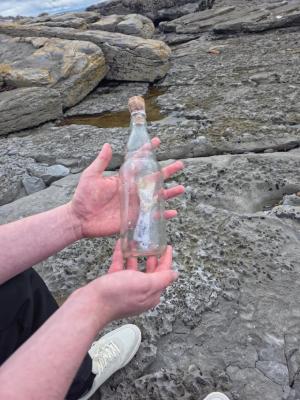Decades ago, the coastal areas surrounding Taiwan were filled with lush underwater vegetation, schools of multicolored fish and a kaleidoscope of healthy and abundant coral reefs.
Take a trip underwater today and you’ll find that all this has changed.
The water remains crystal clear, but now all it reveals is a deep, cold ocean virtually devoid of life, said Allen Chen (陳昭倫), an assistant research fellow at Academia Sinica’s Biodiversity Research Center.
The fish from these waters have either been served on seafood platters or have moved on to distant, safer waters, he said. The vegetation has disappeared following the collapse of what was once a healthy and sustainable eco-system.
Now the last vestiges of a different time are also in danger of disappearing from Taiwan’s coasts.
Chen said the coral reefs on Taiwan’s coastlines were disappearing at an alarming rate. A study conducted by the Taiwan Environmental Information Center (TEIC) shows coral reefs have been retreating in 11 of their 16 testing locations. Moderate increases were found in the other five.
“Overfishing, pollution and wastewater are all really big problems for the coral reefs,” said Lulu Keng (耿璐), the project manager at TEIC.
Using volunteers and testing methods from the worldwide Reefcheck Foundation, her organization will continue testing the health of reefs throughout the year.
Coral reefs can be found in most coastal waters around Taiwan and its outlying islands save the eastern coast. They are living eco-systems that form in tropical and subtropical waters. Chen said they were also an essential ingredient for a healthy and sustainable ocean.
“Coral reefs are essentially communities, they need fish and other marine life in order to be sustained and vice versa,” Chen said.
The fish provide essential nutrients that maintain the structure of the coral reefs, which in return provides marine life with a habitat.
“Think of coral reefs as an office building. What happens when all the cleaners, security guards and maintenance staff disappear?” Chen asked.
He said that the Fisheries Agency needed to regulate fishing to allow the coral reefs a chance of survival.
However, when asked to comment, the Fisheries Agency denied any direct correlation between the fishing industry and disappearing coral reefs and fish stocks.
“Fishing is already heavily regulated in most coral reef areas,” Fisheries Agency Deputy Director-General Chen Tian-shou (陳添壽) said.
Instead, he drew attention to the problems of global warming and climate change, which he said had a much bigger impact. He also said that protection of coral reefs fell under the jurisdiction of many agencies, including the Forestry Bureau.
The comments from the Fisheries Agency reflect the failure to coordinate a common approach to the problem, Allen Chen said. He added that government agencies must work together in producing a comprehensive plan that includes regulation, protection and education — before it is too late.
Reports released by the UN’s Environment Programme state that threats to 58 percent of the world’s coral reefs were a result of “overfishing, coastal development and other human activity.”
The agency also said that by late 2000, 27 percent of the world’s coral reefs had disappeared.
One thing is certain — coral reefs are recovering more slowly after the typhoons and tropical storms that battered Taiwan earlier this year.
“Typhoon Morakot [in August] showed how fragile these coral reef systems have become,” Keng said.
She said she found mounds of “broken and overturned reefs” after leading a group of divers to inspect the typhoon’s aftermath.
In Lanyu (蘭嶼), coral reefs were reduced to 17 percent as a result of the typhoon, from 67 percent coverage in 2004. Other islands, including Liouciou (小琉球) and Penghu (澎湖), suffered similar damage.
However, there is still cause for optimism, Keng said, citing a case in which divers found out first hand how resilient coral reefs could be if left undisturbed.
“Divers who visited the Northeast and Yilan Coast National Scenic Area (東北角暨宜蘭海岸國家風景區) last year said there was nothing to see, that the coral reefs were mostly dead,” she said. “However, this year, we found that after being left alone, the coral reefs had mostly regenerated … It was beautiful.”
Coral reefs are home to dozens of fish species and are an accurate measure of how we are treating our oceans, Allen Chen said.
“Healthy coral reefs lead to a healthy ocean, which in turn is the key to the health of people,” he said.

FINAL COUNTDOWN: About 50,000 attended a pro-recall rally yesterday, while the KMT and the TPP plan to rally against the recall votes today Democracy activists, together with arts and education representatives, yesterday organized a motorcade, while thousands gathered on Ketagalan Boulevard in Taipei in the evening in support of tomorrow’s recall votes. Recall votes for 24 Chinese Nationalist Party (KMT) lawmakers and suspended Hsinchu City mayor Ann Kao (高虹安) are to be held tomorrow, while recall votes for seven other KMT lawmakers are scheduled for Aug. 23. The afternoon motorcade was led by the Spring Breeze Culture and Arts Foundation, the Tyzen Hsiao Foundation and the Friends of Lee Teng-hui Association, and was joined by delegates from the Taiwan Statebuilding Party and the Taiwan Solidarity

Instead of threatening tariffs on Taiwan-made chips, the US should try to reinforce cooperation with Taiwan on semiconductor development to take on challenges from the People’s Republic of China (PRC), a Taiwanese think tank said. The administration of US President Donald Trump has threatened to impose across-the-board import duties of 32 percent on Taiwan-made goods and levy a separate tariff on semiconductors, which Taiwan is hoping to avoid. The Research Institute for Democracy, Society, and Emerging Technology (DSET), a National Science and Technology Council think tank, said that US efforts should focus on containing China’s semiconductor rise rather than impairing Taiwan. “Without

An SOS message in a bottle has been found in Ireland that is believed to have come from the Taiwanese captain of fishing vessel Yong Yu Sing No. 18 (永裕興18號), who has been missing without a trace for over four years, along with nine Indonesian crew members. The vessel, registered to Suao (蘇澳), went missing near Hawaii on Dec. 30, 2020. The ship has since been recovered, but the 10 crew members have never been found. The captain, surnamed Lee (李), is believed to have signed the note with his name. A post appeared on Reddit on Tuesday after a man

President William Lai (賴清德) today condemned an alleged attempt by two Chinese to snatch a letter of congratulations handed to Taiwan’s taekwondo team after they won silver at the Summer World University Games in Essen, Germany, yesterday. A Chinese man and woman reportedly tried to snatch a congratulatory letter to athletes Hung Jiun-yi (洪俊義), Jung Jiun-jie (鍾俊傑) and Huang Cho-cheng (黃卓乘) from the Ministry of Education, and then argued with media employees. “Why are you taking our things?” the media employees asked. “Does that say Chinese Taipei?” the two Chinese reportedly said. Following the incident, Sports Administration Director-General Cheng Shih-chung (鄭世忠) wrote on